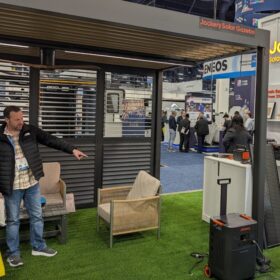The Texas Renewable Energy Cooperative (TREC) – a state authorized program being run by the private company Texas Energy Aggregation (TEA) – has put out a request for proposals (RFP) to supply at least 150 MW of minimum load to more than twenty public entities (state agencies, cities, medical institutions, college districts, and public and private universities), who’ve signed a letter of intent to buy renewable electricity. They’re asking for – and getting – pricing below 3¢/kWh.
TEA is combining wind and solar from specific off-site plants to cover the minimum load, while allowing flexible short-term power to still be bought from the grid. The company touts that they get real projects built, versus simply buying renewable energy credits.
The group is is targeting 12+ year power purchase agreements in 25 MW increments. TEA says two final bidders will be notified mid-May and asked to submit best numbers, with an end of May awardee notification. In a press release, TEA noted that they’ve “confirmed receipt of multiple bids for wholesale electricity below the 3-cent per kWh target price.”
TEA is offering a combination of wind and solar power that will be ‘sleeved’ through various retail energy providers, as these same groups will be contracted to provide standard grid power in short term increments. The location and load profiles of the facility getting the electricity – as well the power plant producing it – will affect the pricing of the electricity, as the companies will be contracting with specific plants for their generation.
TEA reports that it is sizing the renewable contracts to their clients minimum average load, somewhere between 30-50% in most cases. If the buyer wishes to fill out their portfolio with clean energy credits, they’re open to.
In its prior RFP, TEA says that it got “within striking distance” of the 3¢/kWh target on a 140 MW procurement for 16 public entities. TEA also offers behind-the-meter solar power, and demand response management for the same groups.
This content is protected by copyright and may not be reused. If you want to cooperate with us and would like to reuse some of our content, please contact: editors@pv-magazine.com.








Since this is about Texas and ERCOT pipeline data came out yesterday…
ERCOT solar proposal pipeline again jumped up bigly +3.655GW to 54.655GW of solar proposals. Solar with interconnection agreements went up 660MW to 7.098GW. Solar with financing secured is up 805MW and now at 3,794.55MW.
Nothing to do with solar, but I just noticed that wind in ERCOT has more finance secured projects than natural gas has proposals. Solar has about 7x more finance secured projects than NG finance secured projects.